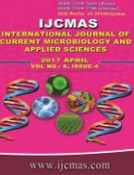


 National Academy of Agricultural Sciences (NAAS)
National Academy of Agricultural Sciences (NAAS)

|
PRINT ISSN : 2319-7692
Online ISSN : 2319-7706 Issues : 12 per year Publisher : Excellent Publishers Email : editorijcmas@gmail.com / submit@ijcmas.com Editor-in-chief: Dr.M.Prakash Index Copernicus ICV 2018: 95.39 NAAS RATING 2020: 5.38 |
The application of hydrocarbon degrading microorganisms in bioremediation applications is a promising approach to accelerate the clean-up of polluted soils. The use of microorganisms to accelerate the natural detoxification processes of toxic substances in the soil represents an alternative ecofriendly and low-cost method of environmental remediation compared to harmful incineration and chemical treatments. Although rhizobacteria found in the rhizosphere possess the ability of promoting plant growth, some rhizobacteria also have the potential of biodegradation polycyclic aromatic hydrocarbons. Keeping this fact in mind this research work was aimed in isolation and characterization of such plant growth promoting bacteria (PGPB) which had the ability to degrade toluene as well as possess plant growth promoting traits. The results obtained revealed that out of seventeen PGPB, three isolates BRB-2, BRB-5 and BRB-9 possessed multiple PGPR traits and had the ability to degrade toluene up to 100-200µL/mL of toluene concentration. The vigour index calculation revealed that the isolates BRB-2, BRB-5 and BRB-9 had vigour index of 1193.49, 1183.5 and 1441.42 respectively which was very high as compared to the control which possessed vigour index 902.4. In conclusion, we reported for the first time the isolation of PGPR from the rhizosphere of Solanum melongena with the ability to utilize toluene as a growth substrate. Further, rhizospheric bacteria may have biotechnological value as materials for cleaning of polycyclic aromatic hydrocarbon containing soil sites.
 |
 |
 |
 |
 |